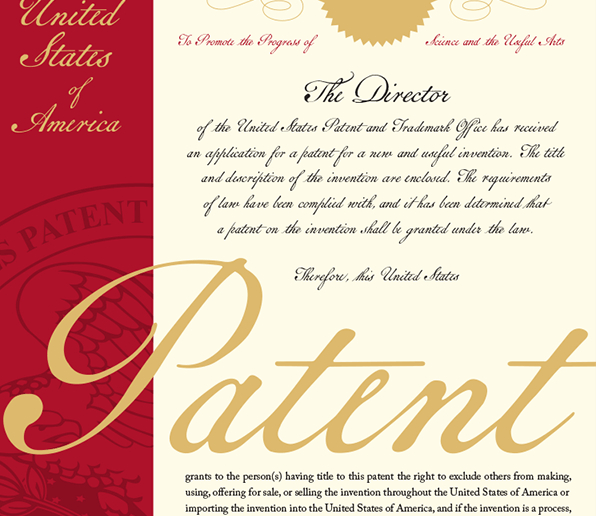Featured:
Latest:
- Questioning the Hanson / Crown Packaging Patent Marking ExceptionsPatent marking involves indicating the patent number on a patented article, or in some limited instances on its packaging or a label. Marking can allow a patentee to recover pre-notice back damages. However, courts have said that marking is not required when a patent has only method claims. But this… Read more: Questioning the Hanson / Crown Packaging Patent Marking Exceptions
- New and Upcoming Changes in U.S. Patent & Trademark Law for 2025Important Developments As 2025 begins, some recent and upcoming changes in patent and trademark practice before the U.S. Patent & Trademark Office (USPTO) for patent and trademark matters merit attention, along with developments from U.S. courts pertaining to those areas of intellectual property (IP) law. (Click the preceding links to… Read more: New and Upcoming Changes in U.S. Patent & Trademark Law for 2025
- Analogous Art for Design PatentsThe Federal Circuit issued an en banc decision in LKQ Corp. v. GM Global Tech. Operations LLC that substantially altered the obviousness analysis for design patents. The so-called Rosen–Durling framework was overruled (largely sidestepping the question of its abrogation by KSR). The patentability of ornamental designs of useful articles will… Read more: Analogous Art for Design Patents
- What Is Failure to Function?Trademark applications are sometimes refused for a failure to function. What is failure to function, and what does a failure to function as a trademark refusal mean? This article addresses the relevant requirements for U.S. federal trademark registrations, how to respond to such a refusal, and introduces a few related… Read more: What Is Failure to Function?
- What Is Non-Analogous Art?Under U.S. patent law, a distinction between analogous versus non-analogous art sometimes arises. Understanding when this concept matters, and how to draw a line between these two possibilities may be important. The following article explains what analogous and non-analogous art is, why it matters, and how to determine whether a… Read more: What Is Non-Analogous Art?
- What Is a Negative Limitation?Patents and patent applications have claims that define an invention. Those claims can have various elements or limitations to recite aspects of the invention. But what is a negative limitation? This article explains what they are and some considerations about whether and when they are permitted. Basic Definition In the… Read more: What Is a Negative Limitation?
- Does Your Patent Allow for Infringement Detection?Patent law places the burden on the patentee to identify infringement and enforce the patent against infringers. This raises an important gating question. How can patent infringement be detected? Some patents—and more specifically some patent claims—can make detection of infringement either easier or more difficult. What follows are some important… Read more: Does Your Patent Allow for Infringement Detection?
- Does a Trademark Registration Prevail Over Prior Use?In U.S. trademark law, use of a trademark matters a lot. Rights generally go to the “senior” user. That is whoever has earlier or prior use. This can mean that determining who is the senior user generally determines who has rights and who is an infringer. But what if a… Read more: Does a Trademark Registration Prevail Over Prior Use?
- How Can You Know if a Trademark Search is Reliable?There are different situations where a trademark search is beneficial. And there are different types of searches with different levels of scope. But how can you know if a given trademark search is reliable? How thorough or extensive does search have to be? Are simple queries in online portals enough… Read more: How Can You Know if a Trademark Search is Reliable?
- How Should a Trademark Search Be Conducted?What should a trademark search involve? How should a trademark search be conducted? These are questions about the scope and format of a trademark search. There are many different ways of performing trademark searches that vary in scope and thoroughness. Not all searches are equal. The right approach will depend… Read more: How Should a Trademark Search Be Conducted?
- Do I Need a Trademark Search?When adopting branding, such as a brand name or logo, people sometimes wonder, “Do I need to conduct a trademark search?” Or, “Is this trademark available?” These questions can arise when considering filing a new trademark application. Or they can come up when adopting branding for new products or services… Read more: Do I Need a Trademark Search?
- What Exclusive Rights Does a Patent Provide?What sort of legal rights does a patent provide to a patent holder? This article explains what exclusive rights arise from patents. It also addresses a common misconception about the scope of patent rights. The Right to Exclude In the simplest terms, patent rights are about the right to exclude… Read more: What Exclusive Rights Does a Patent Provide?
- What Is the Federal Circuit?In the field of U.S. intellectual property (IP) law, there are often references to the Federal Circuit. What is the Federal Circuit? This brief article will explain it. Overview The United States Court of Appeals for the Federal Circuit, or “Federal Circuit” for short, is a U.S. Federal appeals court.… Read more: What Is the Federal Circuit?
Have an invention you would like to patent? Have a brand you would like to register as a trademark? Concerned about infringing someone else’s intellectual property? Is someone else infringing your IP? Need representation in an IP dispute? Austen is a patent attorney / trademark attorney who can help. These and other IP issues are his area of expertise. Contact Austen today to discuss.
















